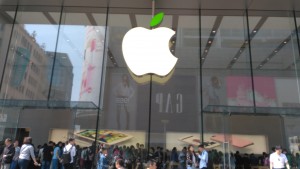SMARTPHONES: Apple Loses, But Really Wins in China Court Ruling
Bottom line: A Beijing court’s finding that Apple’s iPhone 6 infringed on a small company’s designs looks flawed, and the judge should be commended for allowing sales to continue pending an appeal of the case.

Apple (Nasdaq: AAPL) is suffering what looks like yet another setback in China, with word that a Beijing court has found the iPhone maker guilty of stealing product designs from an obscure smartphone maker in south China. But a closer look at the reports shows that perhaps even the Beijing judge that made the ruling realizes how ridiculous the case is, and has allowed Apple to continue selling its iPhone 6 phones in China pending an appeal. Such an appeal is likely to take months or perhaps even a year, by which time iPhone 6 sales will probably be insignificant anyhow.
I have lots of opinions about China’s legal system, which is trying very hard to become world-class in important areas like intellectual property (IP), trademark protection and anti-competitive behavior. But despite those efforts, the system still has a long way to go and often makes decisions that seem somewhat dubious due to lack of experience and also what some perceive as a bias towards local companies over big multinationals.
I’ll be the first admit that copying of product designs occurs regularly, especially in China’s smartphone industry where competition is fierce and products look increasingly alike. But to say that a $500 billion company like Apple, which invests huge sums each year on R&D, had to steal its iPhone 6 product designs from an obscure company called Shenzhen Baili just seems a bit too preposterous to even be taken seriously.
But a Beijing judge certainly didn’t see it that way, and has ruled that the iPhone 6 shares a striking number of similarities with Baili’s 100C phone model. (English article; Chinese article) There’s no additional details on the actual case, though presumably Baili was able to show that its 100C model was being offered for sale before the iPhone 6, and that the 2 products shared enough similar design elements to justify its copying allegations.
In most western markets, a judge would order the infringing party in such a case to immediately stop sales of the relevant product even if the loser planned to appeal. That’s because in sectors like smartphones where product life cycles are very short, it’s always quite possible that an offending product will already be obsolete by the time an appeals court actually makes a new ruling in the case.
Doubtful Decision
But in this case the Beijing judge seems to be doubting his or her own decision, and has allowed sales of iPhone 6 models to continue pending a review by an intellectual property court. Apple is making sure that everyone knows this, and is being uncharacteristically chatty in telling anyone who will listen that iPhone 6 models are still available throughout China. In this instance the ruling only affected iPhone 6 sales in Beijing anyhow, but Baili potentially could have filed similar cases in other cities using the Beijing decision as a precedent.
This particular ruling comes just a month after Apple suffered a similar setback in another Beijing court, where a judge ruled that a company called Xintong Tiandi was the rightful owner of iPhone trademark for use on leather goods. (previous post) In that case and also probably this latest case one, it does appear that both judges made a good-faith effort to interpret the law in a way that would be fair to both sides.
But the fact of the matter is that China’s legal landscape is quite murky, since companies often copy foreign products and trademarks before they formally enter China. What’s more, the patent and trademark registration system is often time consuming, and can even take years in some complex cases. Local companies often take advantage of those realities to locally register trademarks, product designs and other technologies that are already well-established abroad but haven’t formally launched in China yet.
At the end of the day, I have to commend the Beijing judge for probably trying to be fair in this case, but also realizing that he or she should defer to a more experienced specialty intellectual property appeals court. Apple may suffer some slight negative publicity due to the ruling, which has been widely publicized. But I suspect that many Chinese will take a view similar to mine, and say it seems quite unlikely that such a global leader like Apple would need to steal its product designs from such an obscure company.
Related posts:
- SMARTPHONES: Apple Loses Trademark Case, in New China Setback
- SMARTPHONES: Apple’s New India Love Affair Leaves China Sweating
- SMARTPHONES: Apple CEO in Search of Good News on China Call
- Today’s top stories
(NOT FOR REPUBLICATION)
